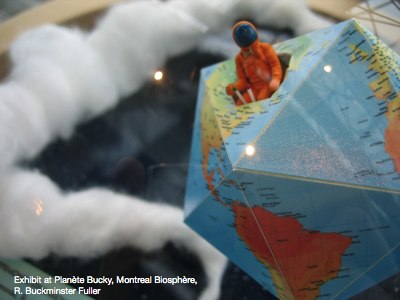Movement
Image source: Exhibit at Planète Bucky, Montreal Biosphère.
So what’s the equivalent for the Web? How can Web creativity be as open and participative as the creativities it touches?
There are things we could be doing to help this. I’ll give you an example. I went to a couple of the academic hypertext conferences, the ACM ones. This is a community of about 150 academics who have been meeting up every year to talk about the nature of hypertext. Like, there are literally discussions on what kind of database structures are being employed. I met a fellow who had an index to the entire Web, on a little hard drive in his pocket. You know, just in case. Be prepared.
Here’s the incredible thing about the conference. They gave a stipend to poets. Hypertext, said the organisers, is a medium about literature. So they had a conference stream – among these academic – that was poetry readings. Poets reading poems composed in hypertext systems of the poet’s own creation. How about that. How about that.
So what if we brought along the people who write fantasy sports teams in Excel spreadsheets and get them to demonstrate what they do, so we can learn how to make the Web better for that kind of creativity. What if the people who run photo competitions on their message-boards, tediously over email, were invited along to show their actual practice, so we could figure out how to enable what they did.
What if there were standard ways for people from outside the Web community to write mini applications and host them on Flickr or Wordpress blogs, or whatever. What if every Wordpress installation was a hosting platform for applications that could be written in two lines. I was really excited to hear yesterday about how GMail has an API for GreaseMonkey.
You know, what if the art of Web design was not to design applications,
but to design kits of parts for other, other differently creative people to design applications, in ways that we don’t expect.
You know, I don’t mean in a really powerful and generic way, but small, accessible, hosted way,
so we end up with a cascading recombinance of web services and miniature, hosted Hypercard-like apps,
as easy as wikis, as easy as blogs and as easy as tagging,
facilitated by us,
but authored by everyone who’s not in this room.
So that’s my third challenge, to find the ignition state for the Web this year.
